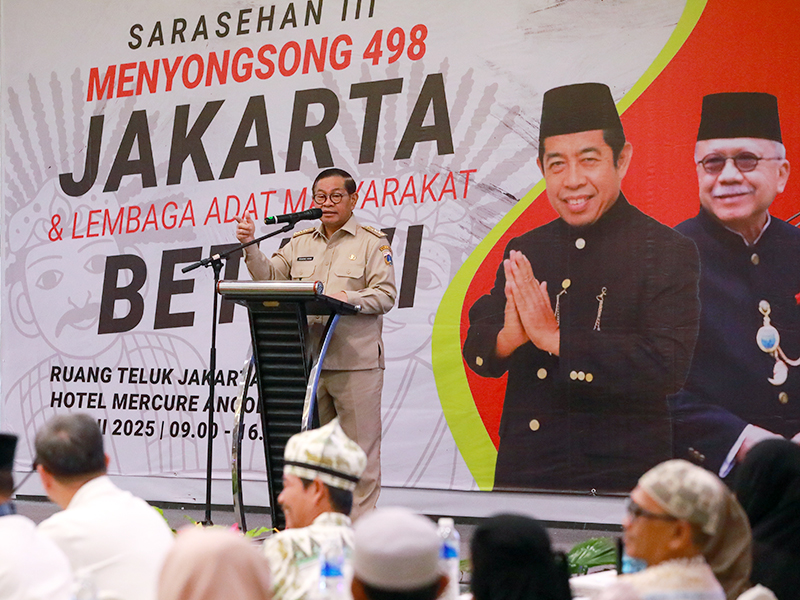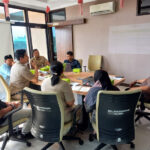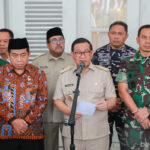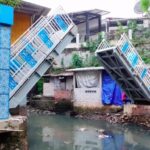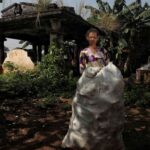The Provincial Government of DKI Jakarta is committed to finalizing the Regional Regulation (Perda) concerning the Betawi Indigenous Community.
«I truly intend to see this through,»
Governor of DKI Jakarta, Pramono Anung, emphasized that the completion of this regulation is mandated by Law No. 2 of 2024.
Pramono made this statement during the III Sarasehan of the Betawi Youth Caucus: «Welcoming the 498th Anniversary of Jakarta and the Betawi Indigenous Community Institution in 2025» at Mercure Ancol Hotel, North Jakarta.
«This is part of our commitment to fulfilling Law No. 2 of 2024. The law mandates it. If not now, I believe we will face difficulties,» said Pramono.
One of the commitments of the DKI Jakarta Provincial Government in preserving and advancing Betawi culture includes plans to prohibit the use of ondel-ondel art as a tool for street performances. Pramono wants ondel-ondel art to be more respected by the public.
«We aim to elevate Betawi culture, making it a highly respected tradition rather than a means for street performances,» he said.
Therefore, he requested the DKI Jakarta Culture Department to promote Betawi culture by showcasing it in various locations. The DKI Jakarta Provincial Government has previously collaborated with 10 five-star hotels to advance Betawi culture.
One example is the Borobudur Hotel, which will feature Betawi cuisine for two months. Additionally, Betawi ornaments will be added to various locations, such as the Tugu Stadium in Koja District, North Jakarta.
Pramono does not want Betawi culture to be reduced to mere symbols. Instead, it should be actively integrated and displayed in various events.
He also proposed naming new hospitals after Betawi figures to strengthen cultural identity.
«For some of the new hospitals we will build, I have requested the Head of the Health Department to name them after Betawi figures,» he said.
Pramono stated that Betawi culture is one of Jakarta’s key strengths in becoming a cultured global city.
«I am determined to ensure that the Betawi indigenous institution or Betawi identity is well-designed,» he affirmed.
Meanwhile, the Chairman of the DKI Jakarta DPRD, Khoirudin, also reaffirmed the council’s commitment to advancing Betawi culture, including finalizing the Betawi Cultural Advancement Regional Regulation.
«The DPRD is committed to enacting the Betawi Cultural Advancement Regional Regulation. I am fully dedicated to this,» said Khoirudin.
Despite having 30 priority regional regulations to complete this year, Khoirudin promised to prioritize the Betawi Cultural Advancement Regulation.
After receiving the draft from the Executive, the DPRD will formulate the regulation through discussions in the Regional Regulation Formation Body (Bapemperda), involving practitioners, community leaders, and stakeholders related to Betawi culture.
«I hope Betawi culture is not just limited to regulations or ceremonial events. It should also be part of formal education in schools,» Khoirudin emphasized.
Betawi Indigenous Community
The Betawi Indigenous Community is the native ethnic group of Jakarta, Indonesia, with a rich cultural heritage blending Malay, Chinese, Arab, and Dutch influences due to centuries of trade and colonization. Historically, they were marginalized during Jakarta’s urbanization, but efforts persist to preserve their traditions, such as *Ondel-ondel* puppetry, *Lenong* theater, and *Keroncong* music. Today, cultural villages like Setu Babakan showcase Betawi arts, cuisine, and customs to promote their identity.
Mercure Ancol Hotel
The Mercure Ancol Hotel is a modern, mid-range hotel located in the Ancol district of North Jakarta, Indonesia, near popular attractions like Ancol Dreamland and Jakarta Bay. It offers comfortable accommodations with easy access to entertainment and business areas. While the hotel itself doesn’t have a long historical significance, it serves as a convenient gateway to Jakarta’s coastal leisure and cultural sites.
ondel-ondel art
Ondel-ondel is a traditional Betawi (Jakarta) folk art form featuring large, colorful puppet figures made of bamboo and cloth, often paraded in festivals and celebrations. Historically, ondel-ondel was believed to ward off evil spirits and bring good luck, with roots tracing back to pre-Islamic animist traditions in Java. Today, it is a vibrant symbol of Jakarta’s cultural heritage, commonly seen in street performances and cultural events.
Borobudur Hotel
The **Borobudur Hotel** is a historic luxury hotel located in Yogyakarta, Indonesia, near the famous Borobudur Temple, a UNESCO World Heritage Site. Opened in the early 20th century during Dutch colonial rule, the hotel blends Javanese cultural elements with colonial architecture, offering guests a refined experience amidst Indonesia’s rich heritage. Today, it remains a prominent hospitality landmark, reflecting the region’s history and serving as a gateway to exploring Central Java’s cultural treasures.
Tugu Stadium
Tugu Stadium, located in Yogyakarta, Indonesia, is a historic sports venue primarily used for football matches. Built during the Dutch colonial era, it has been a significant site for local athletics and community events. The stadium is named after the nearby Tugu Monument, a landmark symbolizing Yogyakarta’s cultural heritage.
Betawi Cultural Advancement Regional Regulation
The *Betawi Cultural Advancement Regional Regulation* is a policy established by the Jakarta government to preserve and promote Betawi culture, the indigenous culture of Indonesia’s capital. It includes measures to protect traditional arts, language, and customs, reflecting efforts to maintain Betawi identity amid rapid urbanization. The regulation highlights Jakarta’s commitment to cultural heritage while supporting local communities in sustaining their traditions.
DKI Jakarta DPRD
The **DKI Jakarta DPRD** (Regional People’s Representative Council of Jakarta) is the legislative body of Indonesia’s capital, responsible for creating local laws and overseeing the regional government. Established after Indonesia’s independence, it plays a key role in Jakarta’s governance, reflecting the city’s political and administrative development. The council operates from a prominent building in Central Jakarta, symbolizing democratic representation in the region.
Regional Regulation Formation Body (Bapemperda)
The **Regional Regulation Formation Body (Bapemperda)** is a governmental institution in Indonesia responsible for drafting and formulating regional regulations (Perda) at the provincial or regency level. It plays a key role in ensuring local laws align with national legislation while addressing regional needs. Established as part of Indonesia’s decentralization reforms post-1998, Bapemperda facilitates democratic local governance by involving community participation in the regulatory process.

